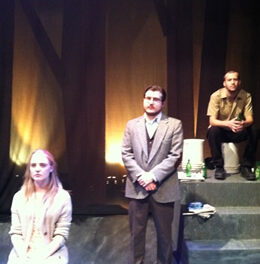Sometimes things sneak up on us. In his welcoming comments before Long Leaf Opera’s April 17 performance, Artistic Director Randolph Umberger noted that the company’s 2003-4 season ends with the 19th and 20th works produced in LLO’s first five years. LLO, he stated, is the only company in the country specializing in operas originally composed to English texts. There are, he observed, hundreds more….
LLO engages mostly local artists for its productions, thus allowing its audiences to hear people who live and work in our midst (more or less) in works they would almost certainly not be performing but for the presence of this company.
In NCCU’s intimate University Theatre, with reduced accompaniments, LLO offered Lee Hoiby’s “The Italian Lesson,” featuring ECU-based soprano Louise Toppin in what was unquestionably a tour de force in both musical and dramatic terms, and Leonard Bernstein’s more familiar “Trouble in Tahiti,” starring Jennifer Seiger and Jean Ronald LaFond (who is also based at ECU).
Hoiby’s libretto is the well-known 1925 monologue of the same title by Ruth Draper (1884-1956). The character actress recorded the piece, which in her rendition lasts a little under 30 minutes. It’s a bit longer in Hoiby’s version, and it went down a lot better as an opera, although the spoken version is certainly worth hearing. The title should probably have been “Everything but… The Italian Lesson” because the upwardly mobile society dame who is the work’s sole character manages to deal with her cook, a husband, children, a math teacher, a puppy, various committees and fundraising projects, a portrait painter, her maid, her driver, and her personal secretary, along the way disposing of concert tickets and arranging a dinner party – while managing to get through all of one line of Dante’s Divine Comedy . If this sounds off-putting, just consider busy-body organizers that plague nearly every social group – or practitioners of the Sununu style of management (swoop in, squawk, make various messes, and swoop out…).
Toppin brought the work to vivid life, prompting more than a little reflection on “polite” society along the way. Her performance was a study in character acting, graced by some of the best singing we have heard from her, ever. Pianist Deborah Hollis was, in her way, every bit as brilliant as the soprano, pointing up the score’s many musical commentaries on the goings-on with delightful precision and helping make “The Italian Lesson” a bona fide tour de force and then some. (For more information about Draper’s monologues, see http://www.drapermonologues.com/monologues.html .)
After intermission, Bernstein’s “Trouble in Tahiti” got underway, accompanied by Hollis, bassist Mark Underwood, and percussionist Brett Connor. Those who weren’t there might be thinking, “Well, that’s pretty paltry…,” but the overall effect was positive. There’s not a pit in this auditorium, so the musicians and Music Director Benjamin Keaton were off to one side. Among other things, this allowed the singers – Seiger, LaFond, and the work’s trio (soprano Kirsten Cervati, tenor Bill Chamberlain, and baritone Steve Dobbins, all veterans of the Durham Savoyards, Ltd.) – to project with the same degree of effectiveness Toppin had achieved, which is to say that every word told. That’s important in opera, and for some reason it seems especially challenging for American singers, working in English, so the accomplishment of LLO in this regard is indeed praiseworthy.
The story of “Trouble” deals with an unhappy couple in whose marriage communications have virtually ended, and LLO’s production helped underscore the characters’ various dilemmas. Simple sets, painted drops, realistic costumes, effective lighting, and astute use of the trio (by Umberger, lighting designer Brett Wahab Hargis, and choreographer Boelyn Willis) enhanced the poignancy of the story, and production stage manager Tracy Francis had made sure everything was in its place. Bernstein wrote some of his most beautiful “show” music for the opera, and the principals were wonderful singing actors (or acting singers). Seiger, heard recently in Capitol Opera’s Hansel and Gretel , was magnificent in her “big tune,” “There is a garden,” which was a highlight of the evening. LaFond seemed a bit raspy of voice – not the norm, according to other critics whose opinions I value and trust – but was strong in the scene in the gym. The “Long Ago” duet, sung by people who could not be farther apart, in terms of their relationship with each other, proved profoundly moving. There’s just enough lightness – in scenes such as “Island Magic” – to keep the audience from bolting, en masse, for a drink (or more). And overall the opera worked with rare magic of its own, thanks to the commitment of the participating artists.
LLO’s 2004-5 season opens with more Hoiby, in the form of The Tempest. Stay tuned for more information.











